|
|
|
Sort Order |
|
|
|
Items / Page
|
|
|
|
|
|
|
| Srl | Item |
| 1 |
ID:
187416
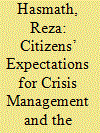

|
|
|
|
|
| Summary/Abstract |
Chinese citizens are relatively happy with the state's management of national disasters and emergencies. However, they are increasingly concluding that the state alone cannot manage them. Leveraging the 2018 and 2020 Civic Participation in China Surveys, we find that more educated citizens conclude that the government has a leading role in crisis management, but there is ample room for civil society organisations (CSOs) to act in a complementary fashion. On a slightly diverging path, volunteers who have meaningfully interacted with CSOs are more skeptical than non-volunteers about CSOs’ organisational ability to fulfill this crisis management function. These findings imply that the political legitimacy of the Communist Party of China is not challenged by allowing CSOs a greater role in crisis management.
|
|
|
|
|
|
|
|
|
|
|
|
|
|
|
|
| 2 |
ID:
160205
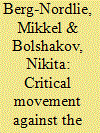

|
|
|
|
|
| Summary/Abstract |
In 2010, Russian authorities presented a new draft law on education, which immediately became controversial. The essay examines whether user groups (parents) and low-ranking sector employees (teachers) were active in the movement critical of the reform, and how the state responded to the anti-reform movement. The movement consisted of several networks and organisations with no central node. It included teachers, parents and activists from both non-systemic groups and systemic opposition parties. Pressure from below by networks and organisations was combined with pressure from actors situated above in the political system, that is, in the Duma. Since the movement was welfare-oriented rather than fundamentally regime-critical, the Russian authorities tolerated open criticism both from civil society and inside the Duma. Some gains for teachers were won, but the movement’s proposed amendments and demands were generally rejected or only introduced in revised form.
|
|
|
|
|
|
|
|
|
|
|
|
|
|
|
|
| 3 |
ID:
144282
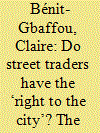

|
|
|
|
|
| Summary/Abstract |
Street trader organisations are paradoxical objects of study. Their claims resist being analysed through the ‘right to the city’ lens, so contested are rights to inner city spaces between multiple users, not all of them in dominant socioeconomic positions; and so ambiguous is the figure of the street trader, oppressed but also appropriating public space for profit, increasingly claiming, in neoliberalising cities, an entrepreneurial identity. In the aftermath of the 2013 ‘Operation Clean Sweep’ (in which the City of Johannesburg unsuccessfully attempted to evict street traders from its inner city), this paper unpacks the politics of street trader organisations: how they organise their constituencies, frame their claims, forge unlikely alliances and enter into disempowering conflicts in engagements with a divisive municipality.
|
|
|
|
|
|
|
|
|
|
|
|
|
|
|
|
| 4 |
ID:
087232
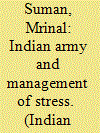

|
|
|
|
|
| Publication |
2009.
|
| Summary/Abstract |
Military's paraplegic rehabilitation (PRC) at Pune provides rehabilitation support to paraplegic and tetraplegic soldiers. Most of the inmates are victims of bullet or other injuries sustained during action in war and counterinsurgency operations. During 1990's a military delegation from a delegate wanted to know the suicide rate amongst the inmates. He found it difficult to believe that it was nill.
|
|
|
|
|
|
|
|
|
|
|
|
|
|
|
|
| 5 |
ID:
151427
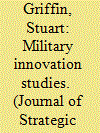

|
|
|
|
|
| Summary/Abstract |
This article explores the evolution of the field of military innovation studies, critiquing its theoretical foundations and setting out a number of challenges that must be overcome if the field is to fulfil its potential and enhance its contribution to wider disciplinary debates as well as to the practitioner community. Tensions between the main theoretical approaches to military innovation are examined as are the challenges inherent in its increasingly multidisciplinary character. The issue of whether military innovation studies constitutes a field in its own right is addressed before recommendations are made to expand the field’s research agenda, broaden its theoretical base and strengthen its multidisciplinary credibility.
|
|
|
|
|
|
|
|
|
|
|
|
|
|
|
|
| 6 |
ID:
119492
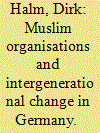

|
|
|
|
|
| Publication |
2013.
|
| Summary/Abstract |
The process of social integration of the people associated with immigrant organisations, and the social (and potentially religious) change that comes with it, present the organisations with the difficult challenge of justifying their legitimacy to various societal actors. This is certainly true of Muslim organisations in Western immigration societies. In Germany, this process is quite clearly reflected within the community of established organisations, which play a part in creating intergenerational change. This is not to say, however, that they will be the only relevant - or even the predominant - actors involved in establishing Islam in Germany in the future, despite their roots in their countries of origin, nor that they will automatically become redundant over time.
|
|
|
|
|
|
|
|
|
|
|
|
|
|
|
|
| 7 |
ID:
085831
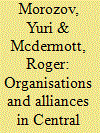

|
|
|
|
|
| Publication |
2008.
|
| Summary/Abstract |
Between 29 April and 1 May, 2008 we attended an international conference that discussed Central Asian security issues. Political scientists and politicians from 17 countries and several international structures gathered in Tashkent for this highly representative forum to assess the already obvious threats to Central Asian security; discuss the new and less obvious threats and challenges; and outline potential cooperation trends aimed at ensuring regional security in the 21st century.
|
|
|
|
|
|
|
|
|
|
|
|
|
|
|
|
| 8 |
ID:
114764
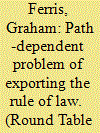

|
|
|
|
|
| Publication |
2012.
|
| Summary/Abstract |
This article examines three indicators of a functioning rule of law state. First, that the executive operates through legally constituted channels: that administrative and political actions are constrained and channelled through legal authority. Second, that trial processes are robust: being genuine attempts to decide according to proof and law, rather than returning decisions that it is hoped will placate the powerful. Third, that no individual entities, be they corporations or individuals, be they economically or politically or militarily powerful, are able to act outside the reach of legal remedy. The work of D. C. North helps in understanding how the failure to implement or reform law successfully is predictable if the relevant features of the society that receives legal transplant or legal reform efforts are ignored. Ultimately, reform must involve domestic agents in its design and implementation because their knowledge of the subjunctive worlds of their own societies is a vital component in the reform process.
|
|
|
|
|
|
|
|
|
|
|
|
|
|
|
|
| 9 |
ID:
176737


|
|
|
|
|
| Summary/Abstract |
The 2018 IPCC report states that all sectors of the economy, and actors at all scales from individuals to governments, must take urgent action to reduce greenhouse gas emissions. Small and medium enterprises (SMEs) are important actors whose use of energy, and potential for energy and carbon savings, are largely overlooked by current efficiency policy in the UK and EU. Using theory, empirical evidence and policy analysis, this paper sets out the case for increased policy focus on SMEs, and proposes ways forward. SMEs account for more than half of industrial and commercial energy use, however, the details of their energy use and the potential for savings is poorly understood. While energy end-uses are similar to those in larger enterprises, SMEs’ capacity for paying attention to energy and responding to policy are different, as are their decision-making processes. Designing and delivering effective policy for this heterogenous group will require strategic segmentation and targeted interventions, in turn demanding improved data. We set out a research agenda to address deficiencies in data and evidence, and propose a series of options for policy makers.
|
|
|
|
|
|
|
|
|
|
|
|
|
|
|
|
|
|
|
|
|